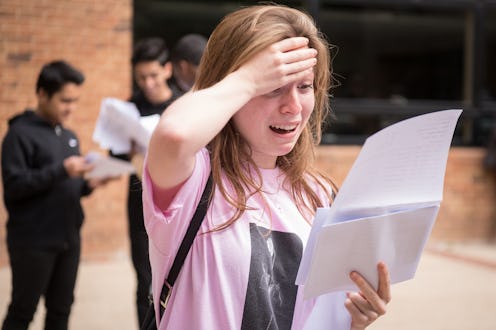News
Oxford Is Giving All Students Extra Time For Exams (But Female Students Especially)

In an attempt to decrease the gender gap in respect to grades, Oxford University has decided to allot more time for students taking math and computer science exams. Undergraduates at Oxford were given extra time (15 minutes) to complete their math and computer science exams in the summer of 2017, and the school claims this has resulted in higher scores for female students, and undergraduates overall.
A spokesman for Oxford told The Telegraph that 39 percent of female mathematicians achieved first class degrees with the extra allotted test time. While that's still lower than the male students, 47 percent of whom earned first class degrees, it's higher than the previous years. In 2017, seven female math finalists achieved firsts compared to 45 men.
Oxford's spokesman added that the decision to lengthen exam time was "academically demanding and fair."
Undergraduates are now given 105 minutes to complete math and computer science exams, an increase from the usual 90 minutes. There was "no change in length or difficulty of questions," the spokesman said. The goal of the new regulations is to reduce "the undue effects of time pressure" for both genders. However, the university found that time constraints disproportionately affected women.
"While outcome disparity between genders was one of the motivating reasons for the increase," Edith Elkind, professor of computing science at Oxford, tells Bustle, "it was certainly not the only one."
The university was looking to increase test scores for all "students most sensitive to time pressure and stress," according to internal documents obtained by The Sunday Times. And while Oxford felt the extended tests "might mitigate ... the gender gap that has arisen in recent years," they also said "the exam should be a demonstration of mathematical understanding and not a time trial."
The decision to lengthen test time came not long after Oxford's history department began to offer take-home exams in an attempt close the gender gap. But that move, too, was not only meant to help just women.
An Oxford spokesman told The Independent:
This change is part of a broader goal of diversifying the history course in response to a number of factors, including the need to test a greater range of academic skills. The gender gap was also a consideration in this change, although research shows that the causes of the gap are broad do not lie solely in methods of assessment.
A lot of people have misinterpreted this latest rule as only applying to female students, which is incorrect. Both women and men now have longer exam times in math and computer science, giving no particular group of students an advantage over another.
"I just graded an exam for the course I taught in Michaelmas term [first academic term]," Elkind says, "and I can assure you that all candidates were given the same amount of time irrespective of gender."
According to Sarah Hart, a math professor at Birkbeck, University of London, women tend to double-check their answers more than men, which could be one reason they tend to perform better when given more time, she explained to the Sunday Times. Men perform better, too, she said, because while they are more inclined to answer quickly, they also get more wrong when they have less time.
"I am a big fan of giving people as much time as they want to do exams," Hart said. "After all, you never have to prove theorems against the clock in real life so mere speed is not what we want to assess."
And judging by the results so far, the longer exams have buoyed everyone's grades, not just women. So, even as women's grades rise, the gap remains. But, the university is hesitant to announce any conclusions based off the first year's results and will continue to "monitor exam data carefully," a spokesman said.
"The departments are not drawing any firm conclusions from the first year's data," they said. "However, third-year female students did show an improvement on their second-year marks."
For now, Oxford will continue to allot extra time for math and computer science exams. "While there is clearly more progress to be made," the spokesman said, "the departments will continue with the longer papers for the foreseeable future, monitoring the exam data carefully."